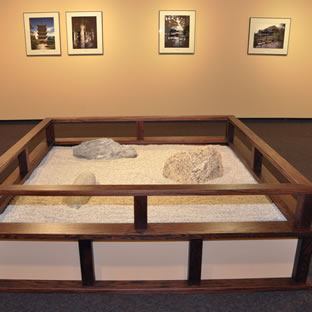UTSA Professor Taeg Nishimoto to speak on Zen themes in space, aesthetics

Display at Institute of Texan Cultures

Display at Institute of Texan Cultures
(Jan. 20, 2011)--UTSA architecture professor Taeg Nishimoto will present a lecture on Zen, a way of thinking that has helped define aspects of Japanese culture and lifeways. Free and open to the public, "On Zen" is 11 a.m. to noon, Saturday, Jan. 22, at the Institute of Texan Cultures.
The lecture is offered in conjunction with the UTSA East Asia Institute and Institute of Texan Cultures co-hosted exhibit, "World Heritage Photo Panels from Japan: Two Thousand Years of Legacies," featuring Japan's World Heritage sites.
A professor and associate dean in the UTSA College of Architecture, Nishimoto often discusses Zen-related themes as they relate to Japanese concepts of space and aesthetics. The Jan. 22 lecture will take into consideration the geography of Japan and many of the locations highlighted in the exhibit.
"Zen in the contemporary Western cultural landscape evokes numerous interpretations and associations," Nishimoto said. "Zen is most tangible in its famous gardens and landscapes. There is a universal appeal to what those images and atmosphere present, and yet they also are the keys to understanding aspects of the Japanese culture in the most contemporary sense."
Nishimoto cites the culturally charged Higashiyama Era as a formative time for Zen. During this era, the historic sites of Ryoan-ji and Ginkaku-ji were built. Also, the Zen garden was developed and grew in prominence. Zen gardens appear throughout the exhibit either physically or in the World Heritage photos. The Zen garden is called the most integrated representation of Zen with a melding of architectural and gardening design.
According to Nishimoto, Zen originated in one of the Buddhist sects of China in the seventh century. The Japanese adaptation and development of Zen pose a unique condition that is both traditional and contemporary in the Japanese sensibility of culture and society. The Zen mindset is one of the most relevant aspects of Japanese heritage.
"World Heritage Photo Panels from Japan: Two Thousand Years of Legacies" is an opportunity to study Japanese culture and defining customs. The exhibit features more than 60 photos of Japan's World Heritage sites. Currently, 14 sites in Japan have been deemed World Heritage sites under UNESCO's World Heritage Convention. These include the Shirakami-Sanchi Mountain Range, Yaku-shima Island, Himeji-jo Castle, and the Buddhist monuments of the Horyu-ji Temple area.
The photo panels are provided courtesy of the Japan Foundation of New York. The exhibit features photographs of World Heritage sites in Japan taken by Japanese photographer Kazuyoshi Miyoshi. The exhibit is co-hosted by the UTSA East Asia Institute and sponsored by H-E-B, the Japan America Society of San Antonio and the Japan Foundation of New York.
Admission to the lecture and exhibit is free, but do not include admission to the main exhibit floor.
The Institute of Texan Cultures is on the UTSA HemisFair Park Campus, 801 E. Durango Blvd., a short distance from the Alamo and the River Walk. Hours are 9 a.m.-5 p.m., Monday-Saturday; noon-5 p.m., Sunday. Admission is $8 for adults (ages 12-64); $7 for seniors (ages 65+); $6 for children (ages 3-11); free with membership, UTSA or Alamo Colleges identification.
For more information, call 210-458-2300 or visit TexanCultures.com.
Events
The UTSA Office of Undergraduate is proud to celebrate National Undergraduate Research with an annual event sponsored by the (OUR) featuring students will showcase undergraduate student research and creative endeavors from all disciplines across campus.
Various LocationsDía en la Sombrilla, formerly Fiesta UTSA, is a festival hosted each spring as a part of Fiesta® San Antonio events. Sponsored by Roadrunner Productions, the event features music, food, confetti, games, event t-shirts, and more.
Sombrilla Plaza and Central Plaza, Main CampusFiesta Arts Fair features contemporary art from more than 100 artists from across the U.S., Fiesta favorite foods, drinks, live music by local and regional performers, and a Young Artists Garden providing opportunities for budding artists to learn, explore and express their creativity.
UTSA Southwest CampusJoin the PEACE Center and Wellbeing Services for Denim Day, a day of learning about the importance of consent and why we wear denim on the last Wednesday of the month each April during Sexual Assault Awareness Month. Stop by our Denim Day display to take a photo in front of our Denim Wall, spin the "Is It Consent?" Wheel, and get a Concha or goodie.
Student Union Window Lounge, Main CampusLearn to use Zotero®, a citation manager that can help you store and organize citations you find during your research. Zotero can generate bibliographies in various styles, insert in-text citations and allow you to share sources with collaborators.
Virtual EventThis event is to achnowlege the graduating seniors and induct the new cohart of scholars to our program.
North Paseo Building (NPB 5.140,) Main CampusCelebrate the accomplishments of College of Education and Human Development, College for Health, Community and Policy, College of Sciences and University College.
Alamodome

